Experimental Petrology
Research Group

Welcome to the Experimental Petrology group
The Experimental Petrology group at the Department of Earth Sciences applies different experimental techniques to simulating processes in the Earth and other terrestrial planet interiors. The interiors of planets are dynamic and impact on surface processes and atmospheres. In our group we have projects spanning from magma degassing to crustal growth and from mantle melting to ore-forming processes.
Opportunities
The research group welcomes expressions of interests from postgraduate students to postdoctoral researchers in the broad area of experimental petrology and geochemistry and natural resources.
Current Research Projects
NERC standard grant 2022-2025 to Bernie Wood.
Sulphur is an important volatile component in volcanic systems in the form of SO2 and H2S gases and major volcanic emissions of SO2 have significant medium-term cooling effects on global climate. Such volcanism is the principal means by which sulphur is transferred from the solid Earth to the crust, oceans and atmosphere where it is an essential nutrient in sulphate metabolism on the seafloor and provides sulphide hosts for economically important elements such as Ni, Cu, Pt, and Au. Given its environmental and economic importance, the aim of this project is to determine the behaviour of sulphur during the processes of generation, ascent, eruption and degassing of magmas.
Horizon replacement grant 2023-2028 to Bernie Wood.
Chlorine and sulphur are of prime importance in the transport of metals as chlorides in volcanic fluids, in the precipitation of metal sulphides in porphyry copper deposits and in the development of the S-bearing cores of planets. Cl and Br, emitted by volcanoes as HCl and HBr are ozone-depleting agents. The principal aim of this project is to determine the dissolution behaviour of chlorine and sulphur in natural silicate melts and in coexisting high temperature fluids and gases at a range of oxygen fugacities, temperature, pressure and H2O contents.
Royal Society Research Professorship 2020-2030 to Jon Blundy.
This project explores the formation of ore deposits from the perspective of transcrustal magmatic systems using a combination of high temperature and pressure phase equilibrium experiments and studies of sub-volcanic geothermal systems. Of particular interest is the concept of liquidus multiple saturation as a means of determining the source conditions of magmas.
NERC DTP award (NE/S007474/1) and St Cross Graduate Scholarship 2023-2027 to DPhil student Rhiannon Ackland.
Monomineralic layers in mafic intrusions are critical sources of rare metals. Following classical work by Korzhinskii on metasomatic zoning (Korzhinskii, 1968), we hypothesise that magnetitite layers form via percolation of buoyant reactive fluids across sharp chemical potential gradients within a near-solidus, crystal-dominated mush. We combine petrological experiments and thermodynamic modelling to test this hypothesis.
Royal Society of New Zealand Catalyst International Leaders Scheme 2023-2025 to Jon Blundy.
This is a collaboration with GNS Science, New Zealand, that explores the potential for co-recovering critical raw materials from geothermal systems, including next generation supercritical geothermal. The project involves hydrothermal flow-through reactor experiments on a variety of volcanic rocks typical of geothermal reservoirs.
Oxford Martin School programme - Director Jon Blundy, 2023-2028.
This is a multidisciplinary project focussed on the geothermal energy and metals potential of Montserrat in the eastern Caribbean. Co-investigators include researchers from Earth Sciences, Chemistry, Economics, Law, History and the Smith School of Enterprise and the Environment. This project supports two Earth Sciences post-doctoral researchers, Lupita Olguin and Petros Bogiatzis. The project involves collaboration with Montserrat Volcano Observatory and the Government of Montserrat.
Shell Research studentship 2023-2027.
This is an industry-funded project to explore the metals endowment of diverse saline geofluids, including geothermal brines and oilfield brines, and strategies for their recovery from solution. The project funds DPhil student Konstantin Nazarov and involves colleagues from Economics and Chemical Engineering.
Engineering and Physical Sciences Research Council grant 2024-2028 to Jon Blundy.
This is a collaborative project with Dermot O’Hare in Chemistry and Bernie Wood in Earth Sciences and provides funding for post-doctoral researcher Austin Gion. The aim of the project is to evaluate different strategies for metals recovery from geothermal brines using high temperature and pressure experiments and a range of ‘smart’ materials, such as zeolites and layered double hydroxides.
Innovate UK grant 2024-2025, PI Jon Blundy.
This is an industry collaboration with Oxford spin-out Ascension Earth Resources, Marriott Drilling and Petriva to investigate the potential for recovering rare earth elements from volcanic rocks on the British Overseas Territory of Ascension Island. The project is being carried out in co-ordination with the UK Foreign and Commonwealth Development Office (FCDO), British Geological Survey and Ascension Island Government.
Australian Research Council Linkage Project 2024-2027, CoI Jon Blundy.
This project, led by John Mavrogenes at the Australian National University, aims to undertake a full assessment of the rare earth minerals, their processing and the environmental impact of production to determine the potential of carbonatite rocks the Gascoyne Region as a new source of rare earth elements. The project involves collaboration with a number of Australian mining companies as well as the Geological Survey of Western Australia and CSIRO.
This DPhil project is part of ERC grant (8086 H2020 NONUNE ERC 885531- PI Prof Tim Elliott (Bristol) and Oxford Radcliffe Scholarship 2022-2026 to DPhil student Bram de Winter.
Earth’s mantle exhibits isotopically heavier silicon (³⁰Si/²⁸Si) and magnesium (²⁶Mg/²⁴Mg) ratios compared to the chondritic meteorites that served as the building blocks of planetary formation. We hypothesise that remnants of basal magma oceans, preserved in the deep mantle, harbour the "missing" isotopic signatures that account for this discrepancy. To test this, we combine equilibrium crystallisation experiments with molecular dynamics (MD) and density functional theory (DFT) simulations.
STFC grant and Clarendon Scholarship to DPhil student Katherine Bormann.
Many aspects of past- and present-day Venus remain nebulous. For instance, while chlorine has been efficiently fluxed from Earth’s interior and is today concentrated in terrestrial surface reservoirs, the surface and atmosphere of Venus appear Cl-depleted. We hypothesise that Cl may once have efficiently degassed from Venus but has since been re-sequestered in Cl-bearing crustal minerals. We investigate this by benchmarking petrological models with mineral-melt partitioning experiments.
Laboratory Facilities
People interested to work in our laboratories are welcome; for interesting projects, we provide access to our experimental facilities to external users, mainly through collaborations.
Please contact Elena Melekhova for more information.
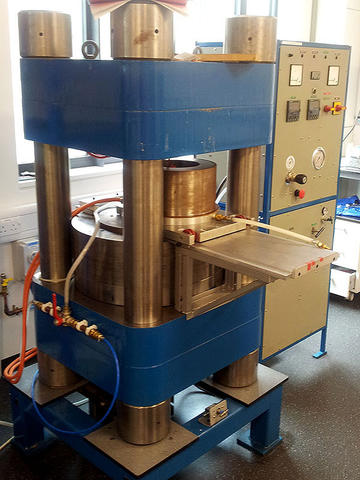
A 500-ton Walker-Type multi-anvil apparatus with a cylindrical pressure module holding 32 mm second-stage tungsten carbide anvils. The apparatus is operated with both castable and prefabricated MgO-octahedra. Pressure ranges from 4.0 -25 GPa and is controlled with worm-gear-type automatic pressure control systems.
Apparatus designed and built by Department of Earth Sciences Workshop.
Applications – behaviour of earth materials in the lower crust and into the shallower parts of the lower mantle. This includes petrology and rheology of mantle phases, transformation mechanisms, reaction kinetics, diffusion, electrical conductivity, and sound velocity at high pressure.
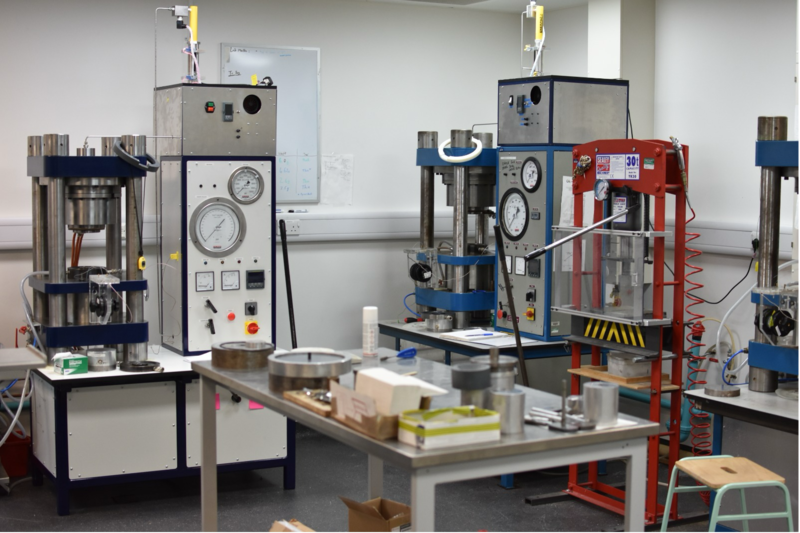
We have three end-loaded piston-cylinder apparatus with ½” and ¾” piston bores (Boyd-England-Type, Bristol design).
- Pressure range: 0.2 - 4 GPa
- Temperature range: up to 1800°C
- Piston bore: ½” and 3/4"
- Piston rams: 90 and 150 tons
- End-load rams: 250-320 tons
- Assembly: NaCl, NaCl-Pyrex-MgO/BN, BaCO3 -MgO/BN, CaF2-MgO/BN
Sample capacity: up to three 2.3mm capsules or single 4mm capsule
Temperature measured with Pt6Rh-Pt30Rh (B-type) or W-Re (C-type) thermocouples (depending on temperature) adjacent to capsule. Pressure range is 0.2 - 4.0 GPa and is controlled with worm-gear-type automatic pressure control system.
Apparatus built by the Department of Earth Sciences Workshop.
Application - igneous and metamorphic petrology (deep crustal processes), materials synthesis, fluid equilibria and element partitioning, rheological behaviour of molten and partially molten systems.
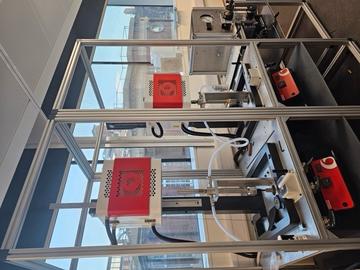
We have two externally-heated cold-seal pressure vessels. The cold-seals are capable of rapid quenching with quenching rates of up to 200 ºC/sec. The vessel is a bored-out Inconel alloy rod that is connected to a pressure system (via a water-cooled seal) and heated externally by a furnace that is lowered over it. Temperature is measured by a K-type thermal couple inserted into a recess in the pressure vessel.
System was designed and built in collaboration with the Department of Earth Sciences Workshop
Technical specifications:
- Vessel material: Inconel
- Pressure: up to 2 kbar
- Pressure medium: H2O
- Temperature up to 900 °C
- Recommended maximum capsule size: 20 x 5 mm
Application - igneous and metamorphic petrology, volcanology (shallow crustal processes), material synthesis, fluid equilibria and element partitioning, rheological behaviour of molten and partially molten systems.
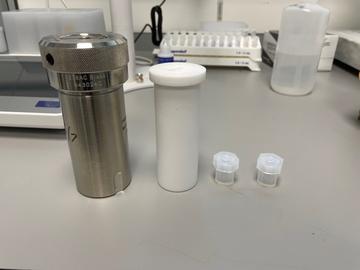
Parr 4745 General Purpose Steel Vessel (Left) with 45 mL PTFE liner (Center) and optional 3 mL (PFA) vials for small volume samples.
Please contact Austin Gion for more information.
Our laboratory is equipped with 45mL Parr Acid Digestion Vessels (model 4745) for performing static hydrothermal experiments aimed at understanding fluid-rock interaction in geothermal systems. These vessels can operate at temperatures of up to 250°C and pressures of ~120 bars. Experiments typically involve powdered rocks and saline geofluids ranging from seawater to synthetic brines. These vessels can also be used with strong acids or bases to explore the stability of a variety of materials in harsh conditions. We currently have 8 vessels and can hold several grams of solid material and up to 20 mL of fluid in each. We can also perform experiments on small volume samples (<100 mg of solid material and <1.5 mL of fluid) by using 3mL PFA vials (x2) within the larger PTFE liner.
Application – fluid-rock interactions, solubility of minerals in aqueous solutions, precipitation and dissolution kinetics.
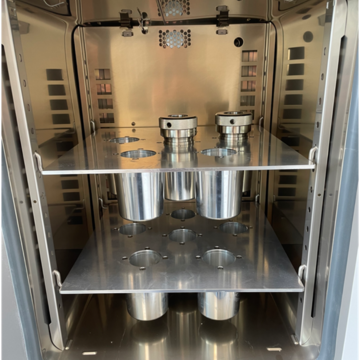
Parr vessels placed inside slotted shelves in oven.
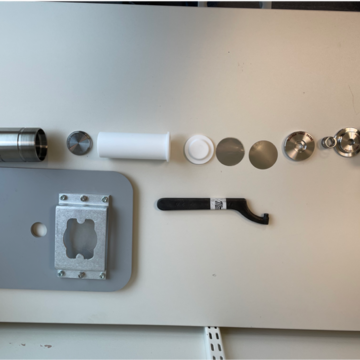
Expanded Parr vessel with (left to right) steel body, lower pressure plate, PTFE liner with lid, corrosion and burst discs, upper pressure plates and brass cap.

We have four GEROTM vertical gas mixing furnaces for heating at controlled oxygen fugacities. These furnaces are a crucial for experimental petrology and materials science. Our furnaces are equipped with CO-CO2-SO2 gas-mixing systems using mass flow controllers. The experiments can be run at ambient pressures and temperatures up to 1650 ºC.
In addition to gas mixing furnaces, we have conventional box furnaces operating in the temperature range 100 to 1400 ºC.
Application – phase equilibria at controlled redox conditions, early planetary formation, volcanic degassing, material synthesis.
People
Resources
Our research group has created a number of online tools that may be of use to you.




